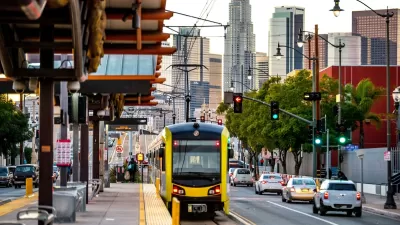A recent report by the American Public Transportation Association (APTA) shows transit ridership increasing to historic levels. The surprise is that the increase occurs as gas prices have fallen.
The news of increased transit ridership around the nation has attracted a lot of attention this week. “In 2013 Americans took 10.7 billion trips on public transportation, which is the highest annual public transit ridership number in 57 years,” explained APTA in a statement announcing the report’s findings.
First, J. Green writes of the “fundamental shift” those numbers represent: “Since 1995, the U.S. population has grown 20 percent, but public transit use has increased 37 percent, while VMT is only up 23 percent. Public transit use has increased far faster than population growth while VMT has largely mirrored population growth.”
Jon Hurdle shares one of the implications of transit’s growing popularity: “The ridership in 2013, when gas prices were lower than in 2008, undermines the conventional wisdom that transit use rises when those prices exceed a certain threshold, and suggests that other forces are bolstering enthusiasm for public transportation…”
Meanwhile, in Houston, some cold water, where Dug Begley reports that Houston’s transit ridership is not growing at pace with the rest of the country.
FULL STORY: Record 10.7 Billion Trips Taken On U.S. Public Transportation In 2013

Alabama: Trump Terminates Settlements for Black Communities Harmed By Raw Sewage
Trump deemed the landmark civil rights agreement “illegal DEI and environmental justice policy.”

Planetizen Federal Action Tracker
A weekly monitor of how Trump’s orders and actions are impacting planners and planning in America.

The 120 Year Old Tiny Home Villages That Sheltered San Francisco’s Earthquake Refugees
More than a century ago, San Francisco mobilized to house thousands of residents displaced by the 1906 earthquake. Could their strategy offer a model for the present?

LA’s Tree Emergency Goes Beyond Vandalism
After a vandal destroyed dozens of downtown LA trees, Mayor Karen Bass vowed to replace them. Days later, she slashed the city’s tree budget.

Sacramento Leads Nation With Bus-Mounted Bike Lane Enforcement Cameras
The city is the first to use its bus-mounted traffic enforcement system to cite drivers who park or drive in bike lanes.

Seattle Voters Approve Social Housing Referendum
Voters approved a corporate tax to fund the city’s housing authority despite an opposition campaign funded by Amazon and Microsoft.
Urban Design for Planners 1: Software Tools
This six-course series explores essential urban design concepts using open source software and equips planners with the tools they need to participate fully in the urban design process.
Planning for Universal Design
Learn the tools for implementing Universal Design in planning regulations.
Ada County Highway District
Clanton & Associates, Inc.
Jessamine County Fiscal Court
Institute for Housing and Urban Development Studies (IHS)
City of Grandview
Harvard GSD Executive Education
Toledo-Lucas County Plan Commissions
Salt Lake City
NYU Wagner Graduate School of Public Service




























